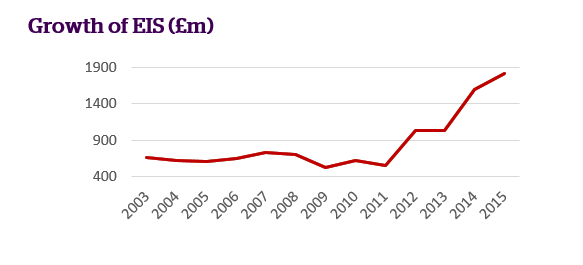We’ve woken up to some good news today – investors poured a record £1.8bn into the UK’s Enterprise Investment Scheme last year, according to new official figures from HMRC.
The new statistics show just under 15% growth in the number of companies raising funds under the EIS, rising from 2,840 to 3,265, whilst the amount of growth capital raised grew from £1.5bn in 2013/14 to a new record of £1.8bn in 2014/15.

What is driving this growth in EIS investing? There is evidence of an increasing level of awareness on the part of private investors. This has been driven in part by the recent emergence of equity crowdfunding players over the past 2-3 years, helping raise the profile of the very attractive tax reliefs available under the EIS.
Financial advisers have also helped to increase awareness, recognising that EIS investments do not all need to be in higher risk start-ups. The EIS rules allow for more mature businesses to be supported and advisers recognise that making EIS investments into these sorts of companies can be a good part of a balanced investment portfolio.
The government is also very supportive of the EIS - it recognises that SMEs are key to the growth of the UK economy, but that the banks are not supporting these companies in the way they used to.
So whilst EIS awareness is clearly on the rise, the £1.8bn raised in 2014/15 would seem to have been provided by only 29,380 investors. However, the number of investors active through the new crowdfunding platforms suggests that the available audience for EIS investments is very much larger than this pool…. This implies that, if more private investors can be made fully aware of the attractions of the EIS, the scheme could become an even more valuable source of growth funding for SMEs.
In terms of these new statistics from HMRC, it’s interesting to note that of the 29,380 claims made for EIS income tax relief in the year, over 80% of those claims were made for amounts under £50k, so only about 20% of these investors making EIS claims for income tax relief were claiming for above £50k. This could suggest that many very wealthy investors are not taking any significiant advantage of the EIS.
Only around 135 investors appear to have made full use of the scheme, making a claim for the full £1m – clearly, if more wealthy investors aspiring to back businesses for up to £1m a year could be attracted to the scheme, this would be a strong boost for funding for SMEs. In our experience, when meeting wealthy or HNW investors we are often surprised that, for a significant number of wealthy invidivduals, there’s a complete lack of awareness of EIS. And we are also surprised by the number of private investors that have backed SMEs but not sought any tax relief.
In terms of overall investors utilising EIS, 29,000 (as shown in these stats) is still a tiny proportion of the people who could be doing this, out of the thousands who want to support our SMEs.
As for the sister scheme, the Seed Enterprise Investment Scheme (SEIS), introduced in 2012 – these new HMRC stats show that SEIS funding is actually relatively static. This could suggest that investors recognise that only being able to raise up to £150k is, for many businesses, too small an amount of capital to build a business of substance. This underlines why many investors and industry commentators have been actively urging the government to consider more generous funding limits for companies raising capital under SEIS in recent times.
So, good news about the strong EIS growth but, going forward, what is possible if EIS/SEIS awareness can be significantly enhanced? As EIS fast approaches £2bn per annum in support for UK SMES, could we see it grow to £5bn, maybe £10bn, per annum in the coming years? I’m sure SMEs would be very excited if this turns out to be the case.
To qualify for EIS/SEIS benefits, investors must be UK resident for tax purposes (or have UK tax liabilities) and subscribe cash for new shares in qualifying companies. Tax treatment is dependent on individual circumstances and may be subject to change.
This content is written in general terms and you are strongly recommended to seek specific advice before taking any action based on the information it contains. No responsibility can be taken for any loss arising from action taken or refrained from on the basis of this content. It is also important to realise that investing in small companies always carries risks, including the loss of capital, illiquidity (the inability to sell assets quickly or without substantial loss in value), lack of dividends and share dilution. Investments should still be made as part of a diversified portfolio.
